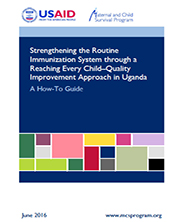The ambitious goal of the Uganda National Expanded Program on Immunization (UNEPI)—“to ensure that every child and high-risk group is fully vaccinated with high quality and effective vaccines against target diseases according to recommended strategies”—has yet to be achieved, despite commendable increases in vaccine coverage over the last few years. Although the Reaching Every Child (REC) strategy for immunization has been in place for more than a decade, many districts and health facilities (HFs) face challenges in implementing it, partially due to inadequate guidance on how to fully and sustainably put REC into operation.
The Reaching Every Child through Quality Improvement (REC-QI) approach combines the full REC strategy and quality improvement (QI) tools and techniques, which provide practical methods that allow EPI stakeholders to explore obstacles to REC implementation, to develop possible solutions, and share learning for sustainability and scale-up. It advances REC from a “what-to-do” strategy to a “how-to” approach for strengthening the routine immunization (RI) system.
This guide, based on experience and lessons learned from introducing REC-QI in Uganda and Ethiopia, provides guidance on how to carry out REC-QI. It supplements, but does not replace, the current national REC strategy. UNEPI, hospital, DHT, and health sub-district (HSD) staff are the intended users of the guide.
An overview introduces readers to QI concepts in REC-QI and explains how to use various QI tools and techniques. These include, but are not limited to: systems thinking, quality work improvement teams (QWITs), a model for improvement that provides a framework for guiding QI, Plan-Do-Study-Act cycles to test change ideas for improvement, tools for analyzing root causes of problems, and peer learning. It explains how REC-QI processes correspond to REC components.
The guide outlines how to introduce REC-QI in districts. Topics addressed during introduction of REC-QI include: macro-mapping; an enhanced RED Categorization Tool; data quality self-assessment and improvement; micro-planning; QWIT formation and management; integrated quarterly review meetings that include non-traditional stakeholders; community and leader engagement; and more. A section on monitoring and evaluation in REC-QI highlights the importance of assessing how key elements of REC-QI contribute to a stronger routine immunization system and suggests corresponding indicators.
REC-QI shows promise in resolving many of the shortcomings noted in the Comprehensive EPI Evaluation of 2015. It specifically addresses challenges such as: the lack of reliable target population data for carrying out micro-planning and performance tracking at lower levels; inadequate monitoring at all levels; inadequate supportive supervision of lower levels; and limited use of data for informing programmatic action. Adding QI to REC offers an iterative improvement approach for building an immunization system strong enough to sustain high-coverage RI. JSI/Maternal and Child Survival Program, 2016.


